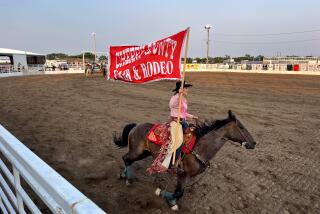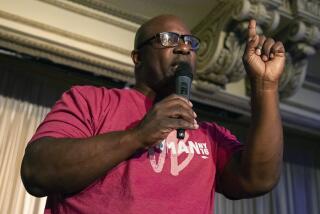Can Recast Clinton Play to Nation?
GLENS FALLS, N.Y. — Six years ago, when Hillary Rodham Clinton first ran for the U.S. Senate, Republican Rep. Thomas M. Reynolds derided her as a carpetbagger who brought nothing to New York but overweening ambition.
Today, he raves about their relationship. “I’ve found her always willing to listen and to roll up her sleeves and go to work with me,” the Buffalo-area lawmaker said in a phone call between recent campaign stops.
Reynolds is no partisan slouch. He has close ties to the Bush administration and heads the Republican Congressional Campaign Committee. He has the most conservative voting record of anyone in New York’s 29-member House delegation.
But like many New Yorkers who were skeptical, if not downright hostile, when Clinton planted herself in affluent Westchester County and started campaigning in 1999, his views of the former first lady have changed considerably. The turnabout helps explain why Clinton is romping to reelection in November -- and may offer clues about how she plans to run for president, if she chooses to take that plunge.
Loved and hated nationally as a liberal crusader who sought to reinvent the country’s healthcare system in one audacious swoop, Clinton is widely seen in her adopted home state as something else entirely: a bipartisan problem-solver who has never seen an issue too parochial for her concern.
Garry Douglas, president of the Plattsburgh-North Country Chamber of Commerce, said his organization presented Clinton with a wish list of roughly a dozen items during her first campaign, including a new crossing at the nearby Canadian border and expanded broadband access for the rural region. She delivered on every one, said Douglas, a Republican who voted against Clinton in 2000 but supports her reelection. Far from the imperial senator he expected, “I have found her to be remarkable in her accessibility,” Douglas said.
Still, for all the attention to the home front, the prospect of a Clinton presidential bid follows her wherever she goes: a community health clinic in Rochester’s rough Crescent neighborhood; at the city’s cheery Museum of Play; on the greensward here in Glens Falls, a slice of small-town America at the foot of the Adirondack Mountains.
“I’m running for reelection, so that’s what I’m focused on,” Clinton told reporters at the Rochester clinic after they ignored her discussion of childhood asthma and lead-paint poisoning to ask about a Time magazine presidential poll. “I don’t really take time out to worry about what’s going to happen in the future.”
That said, Clinton won’t promise to serve her entire term if reelected. When her husband was Arkansas’ governor, he did pledge to finish his term -- and broke the promise when he won the White House in 1992.
But Clinton strategists are mindful of how New York’s Nov. 7 election returns will be studied. They are prepared to argue that a strong showing in traditionally Republican upstate New York proves that, if she runs for president, Clinton can reach beyond hard-core Democrats and win over independents and even dubious Republicans.
Yet skepticism abounds.
“I’m glad they love her in New York. I’m glad they think she’s a great senator,” said Dick Harpootlian, a longtime Democratic activist in South Carolina. “In the next 26 months, do you think there’s enough money on the face of the Earth for 51% of the country to know her that well? I don’t think so.”
Harpootlian has been friendly with the Clintons since their Arkansas days, but for the 2008 presidential election he is leaning toward former Virginia Gov. Mark R. Warner. Harpootlian believes too many Americans have a negative impression of the former first lady -- and he doesn’t think “there’s enough television, enough mail or enough phone calls to change that.”
In response, Clinton boosters point out that such talk was common when she first ran for the Senate.
After some early missteps -- including a flap over the financing of her new Westchester home -- Clinton proved a far more adept campaigner than many expected. She displayed a work ethic that has carried over to the Senate: long hours, strong follow-through, attention to minute detail, and a willingness -- with celebrity as her calling card -- to go just about anywhere and speak to any audience, however small.
Even back in 2000, Clinton made a point of courting conservative upstate voters, vowing to make the region’s economy -- perennially sick -- one of her priorities. Clinton touted a plan to create 200,000 new jobs in the region during her first term, and though she has failed -- the region has lost jobs, according to the Federal Reserve Bank of Buffalo -- many seem to give her credit for at least trying.
She is not one to enthrall audiences the way her husband did, but to paraphrase another famous New Yorker, Woody Allen, Clinton gets a great deal of credit simply for showing up.
“We’re glad you’re here,” a beaming Mark Levack, a 44-year-old Republican developer, told Clinton when she met with Glens Falls business leaders and joined them on a stroll through its red-brick downtown. “It sends a message you really care.”
Clinton faults President Bush for the region’s economic troubles, though the upstate area struggled throughout her husband’s eight years in the White House as well. “I hope that we get new policies starting in November,” she told reporters after her walking tour ended with a small rally of sign-waving supporters.
As the blame-shifting suggests, Clinton doesn’t shrink from Washington’s partisan combat. In the last few months, she helped lead the Democratic fight for a boost in the federal minimum wage and for over-the-counter sale of the “morning after” Plan B contraceptive.
Though she broke with many Democrats by voting to authorize the invasion of Iraq and by introducing a bill to outlaw flag-burning -- stirring liberal rumblings about Clintonian “triangulation” -- her voting record places her to the left of 80% of her Senate colleagues, according to the nonpartisan National Journal.
She faces little threat from her challenger in New York’s Sept. 12 Democratic primary, Iraq war opponent Jonathan Tasini.
Clinton’s great political feat has been defying expectations, forging friendships and working on legislation with a number of high-profile Republicans -- and not just New Yorkers -- such as former House Speaker Newt Gingrich of Georgia and, perhaps most improbably, Sen. Lindsey Graham of South Carolina, who helped bring the impeachment case against Clinton’s husband. She describes the two of them as “chairs of the Strange Bedfellows Committee.”
The hands-across-the-aisle approach has helped refashion Clinton’s image at home. In September 2000, during her first Senate race, 62% of New York voters described Clinton as a liberal and 23% as a moderate, according to a Quinnipiac University poll. A follow-up survey this June found 47% describing Clinton as a liberal, and 34% calling her a moderate. Nearly one in three Republicans approved of her job performance.
But changing her image outside New York is another matter.
A White House bid is different than running for reelection to the Senate; political philosophy matters much more, and it is hard for candidates to pork-barrel their way to the presidency.
Even a big fan like Douglas, of the North Country Chamber of Commerce, said he would have to “wait and see” before deciding whom to back in 2008.
And some question whether New York, even upstate, is much of a political proving ground.
The state Republican Party is in terrible shape, and the White House, often eager to intercede in state races, took a surprising pass.
“The good news is she has token opposition,” said pollster Lee M. Miringoff of Marist College in Poughkeepsie, N.Y. “The bad news is she’s not going to prove a whole lot running up the score in a strongly Democratic state in a strongly Democratic year.”
More to Read
Get the L.A. Times Politics newsletter
Deeply reported insights into legislation, politics and policy from Sacramento, Washington and beyond. In your inbox three times per week.
You may occasionally receive promotional content from the Los Angeles Times.











